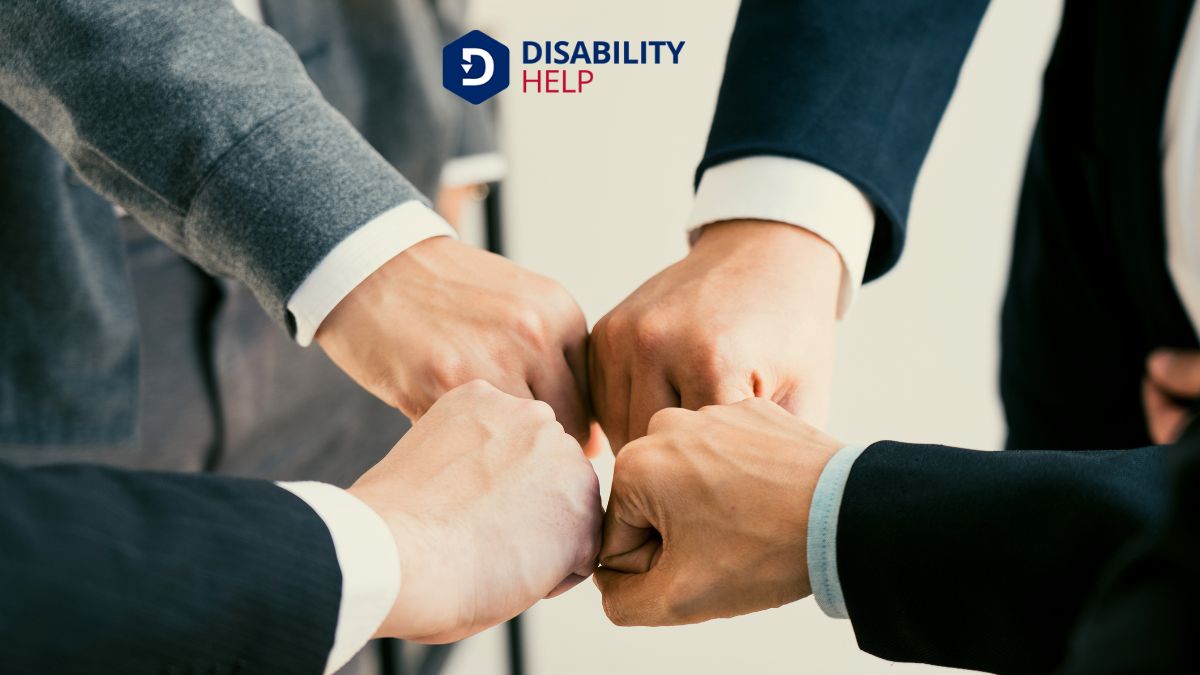Non-compliance with disability laws hits businesses hard. We face legal battles and heavy fines, damaging our finances and reputation. Customers who perceive our disregard for inclusivity might lose trust, impacting loyalty and sales. Operations can be disrupted as resources are diverted to legal matters, and morale drops. Ignoring these laws also limits workforce diversityThe inclusion of individuals from a wide range of backgrounds, including people with disabilities., hindering innovation. It’s vital to understand these risks to maintain our standingThe legal right to bring a lawsuit, which requires that the individual bringing the suit has a direc... and foster an inclusive environment. Want to explore further?
Key Takeaways
- Non-compliance with disability laws results in significant legal repercussions, including lawsuits, fines, and governmental investigations.
- Businesses face reputational damage and loss of consumer trust due to non-compliance with disability laws.
- Companies experience operational disruptions as resources are diverted to handle legal issues related to non-compliance.
- Non-compliance limits workforce diversity by hindering employment opportunities for individuals with disabilities.
- Organizations risk long-term financial instability due to legal battles and increased insurance premiums from non-compliance.
Legal Repercussions and Financial Penalties

When businesses fail to comply with disability laws, they're not just ignoring ethical responsibilities; they're also exposing themselves to significant legal repercussions and financial penalties.
We must recognize that these laws aren't mere suggestions but binding regulations. Failure to adhere can result in lawsuits that drain resources and time. Legal battles often lead to hefty fines, settlements, or court-awarded damages that can cripple a company financially.
Moreover, non-compliance can trigger governmental investigations, leading to further sanctions. Agencies like the Equal Employment Opportunity Commission (EEOC) and the Department of Justice (DOJ) actively enforce these laws, ensuring that businesses meet their obligations.
We should understand that maintaining compliance isn't just about avoiding penalties—it's about fostering an inclusive environment that benefits everyone.
Impact on Business Reputation
When we ignore disability laws, we risk damaging our business reputation.
Customers may see us negatively, leading to decreased brand trust and possibly even a loss of partnerships.
It's vital to understand that how we treat accessibilityThe design of products, devices, services, or environments to be usable by people with disabilities.... can directly impact how the public perceives our brand.
Negative Public Perception
Failing to comply with disability laws doesn't just lead to legal repercussions; it also damages a company's reputation.
When word spreads that a business isn't inclusive or accommodating, we all know it can lead to negative public perceptionThe collective attitudes and beliefs of society towards individuals with disabilities, often shaped .... People start questioning a company's values and commitment to equality and fairness. Customers and potential clients often choose to support businesses that align with their values.
As a result, ignoring disability laws can cause a ripple effect, with negative opinions spreading through social media and word of mouth.
We need to understand that maintaining a positive public image is essential for long-term success. Let's focus on inclusivity and demonstrate a genuine commitment to all individuals. This helps us build a more positive reputation and fosters community support.
Decreased Brand Trust
Although companies may not immediately feel the impact, non-compliance with disability laws inevitably leads to decreased brand trust. When we fail to prioritize accessibility, customers start questioning our commitment to inclusivity and equality.
They notice when our services or products aren’t accessible to everyone, and this can damage our reputation. Trust is the cornerstone of successful business relationships, and once it’s compromised, it’s incredibly challenging to rebuild.
In today’s world, where consumers are more informed and socially conscious, any hint of non-compliance can quickly spread. People talk, and news travels fast, often reaching potential customers who prefer to support brands that align with their values.
Let’s guarantee our actions reflect our commitment to all individuals, safeguarding and enhancing our brand trust.
Loss of Partnerships
As businesses, we must recognize that non-compliance with disability laws doesn’t just affect our customers, but it can also lead to the loss of valuable partnerships.
When our partners observe our failure to adhere to these critical regulations, they may question our commitment to inclusivity and integrity. This doubt can have tangible consequences:
- Loss of Trust: Partners may hesitate to collaborate with us, fearing reputational damage by association.
- Decreased Opportunities: We might miss out on strategic alliances that drive innovation and growth.
- Financial Impact: Existing partners could withdraw support, affecting our bottom line.
Loss of Customer Trust and Loyalty
When businesses disregard disability laws, they risk losing the trust and loyalty of their customers, which can have long-term repercussions.
We all value companies that demonstrate inclusionThe practice of creating environments in which any individual or group can be and feel welcomed, res... and respect for everyone. When a business fails to comply with disability laws, it sends a message that they don’t prioritize these principles. Customers, especially those who are directly affected or have loved ones with disabilities, notice this disregard and may choose to take their business elsewhere.
In today’s interconnected world, news of non-compliance spreads quickly, damaging a company’s reputation.
We trust companies that adhere to ethical practices, and when they fall short, it’s hard to regain that trust. Our loyalty shifts towards those who consistently show they care about accessibility and inclusivity for all.
Potential for Operational Disruptions
Non-compliance with disability laws can lead to significant operational disruptions that we must consider.
When we overlook these laws, we risk facing unexpected challenges that can impact our daily operations. Here are a few potential disruptions we should be aware of:
- Legal Actions: Non-compliance can result in lawsuits, which can divert resources and attention from our primary business activities.
- Increased Costs: We might face fines and penalties, leading to higher operational expenses.
- Reputation Damage: Our reputation could suffer, affecting relationships with clients and partners.
Barriers to Workforce Diversity
When we ignore disability laws, we limit employment opportunities for a significant portion of the population, hindering our efforts toward true workforce diversity.
It's essential that we address workplace accessibilityThe design of workplaces to be usable by individuals with disabilities, including physical access, t... challenges, as they prevent many talented individuals from contributing to our organizations.
Limited Employment Opportunities
Despite efforts towards inclusivity, many workplaces still present significant barriers for individuals with disabilities, limiting employment opportunities and hindering workforce diversity.
We need to acknowledge that these barriers lead to a lack of representationThe way people with disabilities are depicted in media, culture, and politics, often influencing pub... and missed potential. For us to move forward, we should focus on understanding the root causes that contribute to these limitations.
- Prejudice and Misconceptions: Some employers may hold outdated views or misunderstand the capabilities of individuals with disabilities, leading to biased hiring practices.
- Inadequate Policies: Without strong policies that support diversity and inclusion, companies may unintentionally exclude potential talent.
- Lack of Awareness: Employers often lack awareness of the benefits that a diverse workforce brings, missing out on innovation and varied perspectives.
Let's work together to break down these barriers for a more inclusive future.
Workplace Accessibility Challenges
Although we've made strides in promoting workforce diversity, workplace accessibility challenges remain a significant hurdle. Many of us mightn't realize how physical barriers, like narrow doorways or inaccessible restrooms, can hinder participation for employees with disabilities.
These barriers prevent talented individuals from fully contributing, impacting not only their careers but our organizational success as well.
We need to evaluate digital accessibility, too. Websites, software, and communication tools must be usable by everyone, including those with visual or hearing impairments.
By addressing these issues, we create an inclusive environment where all employees can thrive.
Let’s commit to identifying and removing these obstacles. By doing so, we’ll foster a diverse and dynamic workforce that reflects our society's varied perspectives and strengths.
Increased Risk of Litigation
Failing to comply with disability laws considerably raises the risk of litigation for businesses and organizations.
When we don't adhere to these laws, we expose ourselves to legal challenges that can be costly and time-consuming.
Let's consider some key points:
- Financial Penalties: Legal battles often lead to significant fines and settlements, which can strain our budgets.
- Operational Disruptions: Court cases can divert our attention and resources away from daily operations, affecting productivity.
- Reputation Damage: Even if we win a case, the legal process can tarnish our standing in the community, potentially affecting customer trust.
Negative Media Attention
When businesses ignore disability laws, they often find themselves in the spotlight for all the wrong reasons. Media outlets are quick to highlight companies that fail to comply with these essential regulations.
This kind of attention can rapidly damage a company’s reputation and erode consumer trust. When negative stories spread, they can lead to public outrage and calls for boycotts, which could further impact a business's bottom line.
We must understand that in today's connected world, news travels fast. Social media amplifies these stories, reaching a global audience almost instantly.
As a result, even a single incident can lead to widespread scrutiny. It’s vital for us to prioritize compliance to avoid becoming a cautionary tale and maintain a positive public image.
Challenges in Market Competitiveness
Ensuring compliance with disability laws isn't just a legal obligation; it's also a strategic advantage in a competitive market.
When we prioritize accessibility, we open doors to a broader customer base and foster loyalty. Non-compliance, however, can lead to significant challenges in market competitiveness.
Let's explore what happens when we fail to meet these standards:
- Limited Customer Reach: We miss out on engaging with a substantial segment of the population.
- Brand Reputation Damage: Negative perceptions can spread rapidly, potentially harming our brand value.
- Lost Business Opportunities: Other companies will likely capitalize on inclusivity, leaving us behind.
Ethical Considerations and Social Responsibility

While market competitiveness faces tangible risks with non-compliance, our ethical responsibilities and social commitments carry significant weight.
When we don’t adhere to disability laws, we’re not just breaking rules; we’re failing to recognize the inherent dignity and rights of individuals with disabilities. This oversight undermines our values, suggesting that profit is more important than people.
By prioritizing accessibility and inclusivity, we demonstrate that we value every member of our community and their contributions.
Let’s remember, social responsibility isn’t just a checkbox; it’s about creating environments where everyone can thrive. Our actions can inspire others and lead to a more equitable society.
If we don’t act ethically, we risk alienating those we aim to serve, diminishing our community’s trust.
Conclusion
To summarize, when we don't comply with disability laws, we're not just risking legal and financial penalties. We're also putting our business's reputation and customer trust on the line. Operational disruptions and barriers to workforce diversity could follow, making us vulnerable to litigation and negative media attention. This not only challenges our market competitiveness but also neglects our ethical and social responsibilities. Let's endeavor to create an inclusive environment that benefits everyone involved.






